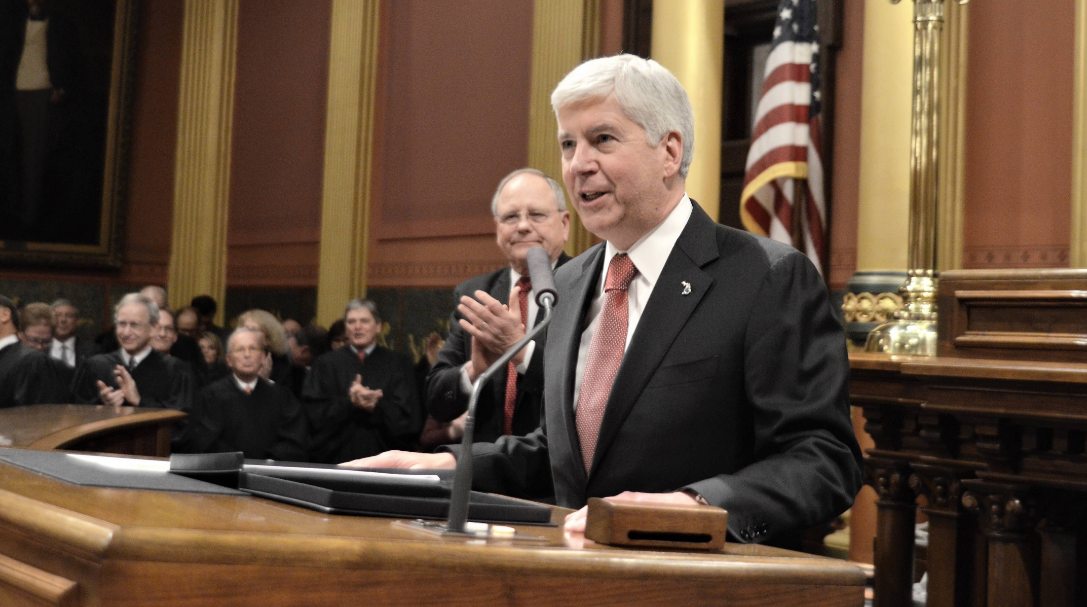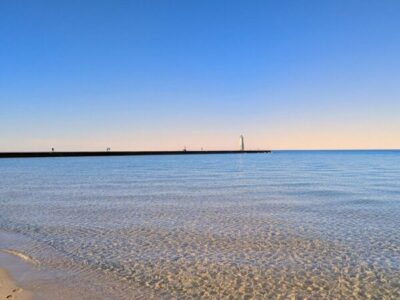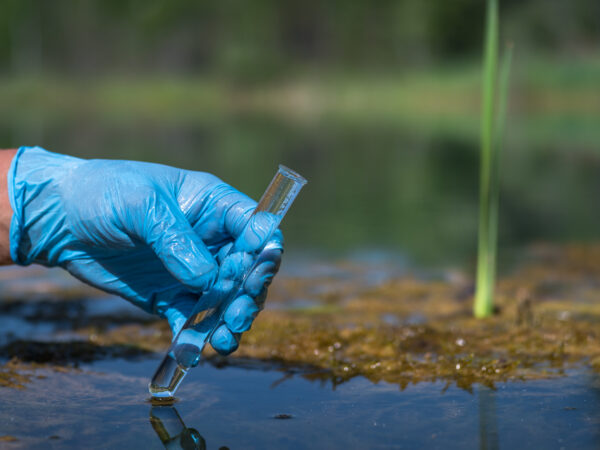
Michigan Governor’s 2018 State of the State Address
The Governor of the Great Lakes State didn’t give much emphasis to the Great Lakes in his Final State of the State Address on Tuesday, January 23rd.
Governor Rick Snyder is chairman of the Great Lakes St. Lawrence Governors and Premiers. He serves on the board of directors of the Great Lakes Protection Fund.
Jobs and the economy were Snyder’s main theme. He said Michigan is in the midst of a major recovery and he took credit for “accelerating this comeback into the future.”
During Snyder’s two terms, Michigan’s unemployment rate dropped from 10.7 percent to 4.7 percent. During that time, the state recovered from a near-financial collapse and Detroit climbed out of bankruptcy.
He said there’s “no question” Michigan is in better shape than it was when he took office in January of 2011, saying “folks, we’re back, and we’re only going to keep going up.”
Governor Snyder said, “Last year, for the first time since the turn of the century, more people came into Michigan than left Michigan.”
But he didn’t make much mention of the thousands of miles of Great Lakes shoreline that brought many of those people to Michigan; the water those millions of people will need to drink, or the aging infrastructure that growing population will rely upon.
He praised the rise in agribusiness and the boom in the wine and beer industry, but he didn’t talk much about the water that is needed to fuel those farms or even mention the taste of the Great Lakes that breweries and vintners say makes their product taste so good.
And he evaded most issues that will leave a black mark on his legacy and only briefly touched on the Flint water crisis.
Flint: “the water has improved dramatically”
On Flint, he said, “We continue to see good water results and we’re continuing the replacement of lead service lines. The city recently completed its third 6-month period with great water test results at 6 parts per billion. That’s comparable to most other Michigan cities. So, the water has improved dramatically.” He says the state is developing a lead and copper rule that will become a role model for the rest of the country.
He talked about some of the recreational opportunities that make Michigan so special, and did a shout-out to the Upper Peninsula’s UP 200 Sled Dog Race in Marquette and the Michigan Ice Fest in Munising.
The Governor said in the past few years, Pure Michigan funding has increased by 36 percent, and in the last three years alone, non-resident daily passes to State Parks in the U.P. have increased by 58 percent. He says it’s becoming a destination around the world.
The Governor was particularly proud of the Iron Belle Trail that will span the entire state started in 2012, which he says will become the largest state wide trail in the nation and eventually contain 2,000 miles of trail for hiking and biking. He said, “We’re gonna show the rest of the world that if you want to have great recreational opportunities in addition to having the best lakes in the world, we’re gonna have the best trails to go with them.”
Asian Carp: “Enough is Enough”
One of Governor’s Snyder’s most passionate moments – for which he received long and loud applause – was about Asian carp. He said there’s “too much talk and not enough action.” He said he’s working with a coalition to invest in the Illinois Brandon Road project to “keep those carp out.” He said, “Enough is enough. If the federal government isn’t going to do it, let’s get together as Michiganders to invest where we need to protect the Great Lakes.”
The governor said recycling was one of the most disappointing initiatives he’s had in his time as Governor. He said Michigan is half the national average on recycling and the state must improve.
The Governor expressed new concern about emerging contaminants, a series of chemical compounds created by non-stick cooking surfaces and fire retardants. He said, “We need to do something now to protect our health.” He said he’s partnering with the federal government to create statewide standards, saying – “lets be pro-active, not re-active.”
He talked about improving Michigan’s aging infrastructure, saying “infrastructure is critical to the quality of our life and economic well-being”, but he mostly referred to roads and bridges, saying, “gotta fix those potholes.”
He says he has a water infrastructure initiative he’ll announce soon, but more needs to be done.
But the Kalamazoo oil spill in 2010, the worst inland oil spill in U.S history which happened six months before he took office? No mention.
The Line 5 Pipeline in the Straits of Mackinac, which prompted Governor Snyder to create and oversee the Michigan Pipeline Safety Advisory Board, and which has topped the news for the past few months as more people call for the Enbridge-owned pipeline to be temporarily shut down or decommissioned? Non-existent.
Mike Shriberg, National Wildlife Federation’s Regional Executive Director Great Lakes Regional Center, tells Great Lakes Now, “While we appreciate the Governor’s enthusiasm about addressing Asian carp, his speech did not address many serious water issues facing Michigan and the Great Lakes. A fleeting mention of Flint, PFAS and water infrastructure does not do justice to the magnitude of the problems of providing safe, affordable drinking water. Neglecting to mention the Mackinac Straits oil pipeline, which the Governor has committed to making a decision on this year, is a significant oversight given the existential threat the line poises to our water and way of life, and the huge public support for decommissioning. We hope the Governor’s final year includes a commitment to address Michigan’s real competitive advantage: our clean water.”
Macomb County’s public works director and former Republican congresswoman Candice Miller tells the Detroit Free Press she’s encouraged that Snyder talked about the state’s need for improved infrastructure, but she said quote, “I would have liked to have seen a little more meat on the bones.”
However, Governor Snyder said in his final State of the State Address: stay tuned. He says he’s going to roll out new initiatives each day next week involving infrastructure, the Clean Michigan initiative, and recycling.




